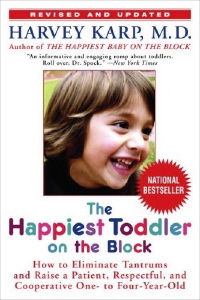Kelli’s excellent “question”:/news/2008/rules-at-the-boyds/#comment-5347 about toddler-discipline has got me thinking again about one of my favorite child-rearing experts and the book that has perhaps influenced my parenting the most in the past twelve months.
One of the things I like most about Harvey Karp is his very soothing, empathetic writing style. This is helpful when problem-solving wild toddler behavior — he makes you feel like it is perfectly normal to be frustrated by your child! (He could just as easily name this book _The Happiest Parent on the Block_.) Just like in his “first book,”:/news/2006/happiest-baby-on-the-block/ Karp does a great job of looking at the world from the child’s _and_ parents’ perspectives, and then offers some good ideas about how to make everyone happy.
The author’s basic premise is that toddlers are essentially like little cavemen or Neanderthals. Since they just aren’t as physically, socially, and emotionally developed as adults, we need to address them at their level. Karp is not trying to be condescending here — he’s just acknowledging that, although they are growing at an incredible rate, they aren’t quite ready for us to respond to them with logical answers and multi-step tasks.
So, parents get a crash-course in cross-generational communication, including lots of loud words, short phrases, and enthusiasm. Karp encourages parents to get down on the child’s level and speak “toddler-ese” to empathize with their intense emotions. “YOU WANT! YOU WANT COOKIE! LUCY WANT COOKIE NOW! NOW NOW NOW!,” he would probably tell me to say. Once Lucy understands that we hear her intense gastronomical desire, that is the point when we can help her move on with logic. “You want the cookie. But no cookie before supper. Let’s eat some grapes instead!” While this method of speaking toddler-ese requires a certain loss of inhibition, I found that it worked quite well most of the time, especially when Lucy didn’t have much in the way of language skills.
Karp offers instructions on disciplinary tactics (including time-outs, loss of privileges, and reward-systems) and explains how to vary these according to your child’s age. I also really appreciated suggestions toward the end of the book on tackling particular topical challenges — new siblings, potty training, fears, and lots more.
But the thing I like most about Harvey Karp is the way he views toddlers as little people, not problems to be solved. He seems to really love and respect children, and that is just the kind of person from whom I want to learn about parenting!
Considered in this review: “_The Happiest Toddler on the Block_”:http://www.amazon.com/exec/obidos/ASIN/0553384422/octothorppres-20, by Harvey Karp.



Yep our little cavemen and women! That’s a great way to think of their growing abilities. And since Mo thoroughly enjoys grabbing and pulling his sissy’s hair, it’s not too hard to imagine.
The toddler discipline book I’ve deemed my favorite in my years of nannying is 1,2,3… Magic! Bad title, but it seriously works. It eliminates having to argue/reason with a little person who often cannot be reasoned with. It also sets it up so you (the adult) are not saying “no” constantly. Works for kids 2-12! It’s Magic!
I am *so* going to get that from the library! I would love to say “no” a bit less around here. Thanks for the recommendation!
1-2-3- Magic comes in a DVD form as well if you want to free up the reading, for lets say Jane Austen! I too found them helpful.
Thanks Ann! (and Allie and Nicole) It took me a while to get here to see this answer but it’s not been long enough that I no longer need these tips! :) As a follow up to my initial question, we started ignoring Eli when he “threatened” to drop his food on the floor (as I had recently heard from a source – babycenter.com? – that toddlers love a reaction and any attention they can get). A couple meal times of that and it’s no longer an issue. Food still gets on the floor but it’s not a deliberate act of rebellion/power struggle. :) We are glad of that! Also, Eli’s first real revelation and acceptance of discipline has happened during bath time. He LOVES the bathtub and is constantly trying to stand up and reach the faucet and knobs. Once he stands up (clearly against house rules) I say, “uh-oh, all done!” and quickly extract him from the tub. The first couple times that happened he threw a big fit but now when I send out a warning “sit down” as he starts to stand, he quickly sits down. Even the other day when he stood completely up and bath time was over there was no crying or protesting. I took it to mean that he understood what he had done and was accepting the consequence. I’ve also noticed that he is much more likely to stand up in the tub absentmindedly when he’s more tired. So we try to get bath time in before he reaches that point of mental exhaustion and distraction.
So, long comment, but wanted to let you know that things are starting to turn around here, though I will look up these two books at the library for near future discipline situations. Thanks, again!
P.S. Just read the comments left after my question and apologize for not checking there earlier! Grandpa is right! – a wealth of information! As I read the comments I began to recall places/things in the house that Eli loves to get into but is not allowed (i.e. the toilet). I think for these situations, I will start trying the timeout to see how it goes. We already have a place in mind. :)